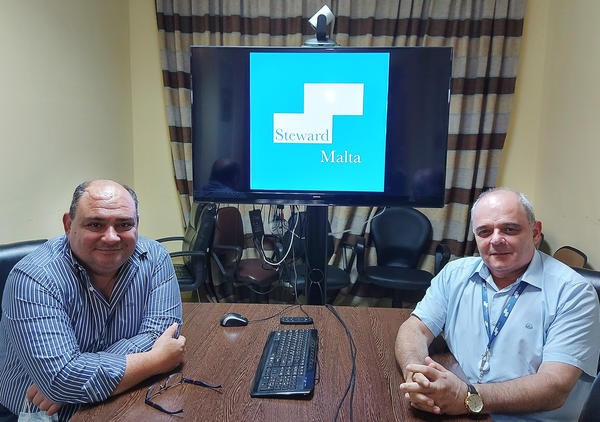The importance of safety in healthcare medication
On the occasion of Patient Safety Day, we sat down with our Quality and Patient Safety Managers Victor Grixti and Lawrence Mizzi, from Karin Grech Hospital and Gozo General Hospital, to discuss the importance of safe medication practices and how the World Health Organisation (WHO) is raising further awareness on medication-related harm.

Victor Grixti and Lawrence Mizzi
Why was it important for the World Health Organization to focus on medication safety for this year’s World Patient Safety Day?
Every person will at some point in their life need medication to prevent or treat an illness. However, medication can sometimes cause serious harm if incorrectly stored, prescribed, dispensed and administered, or if monitored insufficiently.
The ongoing COVID-19 pandemic has significantly exacerbated the risk of medication errors and medication-related harm. In light of all this, ‘Medication Safety’ has been selected as the theme for World Patient Safety Day 2022, with the slogan ‘Medication Without Harm’.
What are the main causes of medication-related harm and how detrimental can this be to patients?
Medication safety is very important for one’s health and much can go wrong if a patient is not taking medication properly or not keeping track of what medication they are taking. The main causes of medication-related harm include, but are not limited to:
- Patients not being familiar with the name and purpose of their medication;
- An outdated medication list;
- One not knowing how to take the medication;
- A patient not consuming the prescribed dose of a particular medication;
- Crushing or breaking medication (unless instructed);
- Storing medication in an environment that is inappropriate, and
- The use of expired medications.
If not addressed, these medication-related harm factors can lead to adverse consequences and may even result in death.
How common is medication-related harm?
Unsafe medication practices and medication errors are leading causes of injury and avoidable harm in health care systems across the world. The annual global cost associated with medication errors has been estimated at USD 42 billion.
Medication errors occur at different stages of the medication-use process, particularly when weak medication systems and/or human factors such as fatigue, poor environmental conditions or staff shortages affect prescribing, transcribing, dispensing, administration and monitoring practices. This can then result in severe harm, disability and even death.
Several interventions to address the frequency and impact of medication errors have already been developed, yet their implementation is varied.
How will WHO’s global campaign help to reduce the impact of medication harm, and what is being done by Steward Malta regarding the campaign?
The third WHO Global Patient Safety Challenge: Medication Without Harm will propose solutions to many of the obstacles the world faces today to ensure the safety of medication practices. WHO’s goal is to achieve widespread engagement and commitment of its member states and professional bodies around the world to reduce medication harm.
‘Medication Without Harm’ aims to reduce severe avoidable medication-related harm by 50% globally in the next 5 years. It was formally launched at the second Global Ministerial Patient Safety Summit in Bonn, Germany, on 29 March 2017.
Steward Health Care Malta is an advocate for patient safety culture and staff are encouraged to report any adverse events related to medication errors. These are discussed monthly and the necessary actions are taken to educate staff. Steward Malta is also working to introduce e-Prescribing Software to keep such errors to a minimum.
In what other ways does Steward Malta ensure patient safety, even beyond the use of medication?
Steward Malta makes sure that patient safety is high on its agenda. In addition to medication safety, the following are the salient measures that are in place to enhance patient safety:
- The correct identification of patients – this is a collaborative process that ensures the accuracy of patient identification before giving blood products or medication, and before drawing blood samples or any type of treatment or procedure;
- Improved and effective communication – we have policies and procedures in place that support consistent practice for verifying the accuracy of written, verbal and telephone communications;
- Ensuring safe surgery – all measures are in place to prevent error in surgery by following three basic principles; a) having the correct patient; b) operating on the correct side, and c) doing the correct procedure;
- Reduced risks of healthcare-associated infections through rigorous hand-hygiene guidelines and ongoing training initiatives to support the continued reduction of healthcare-associated infections, and
- Reduced risks of patient harm resulting from falls; various measures are implemented to reduce fall risk. Steward Malta has a process in place that ensures every patient undergoes an initial assessment for fall risk, followed by a reassessment when indicated by a change in condition or medication.